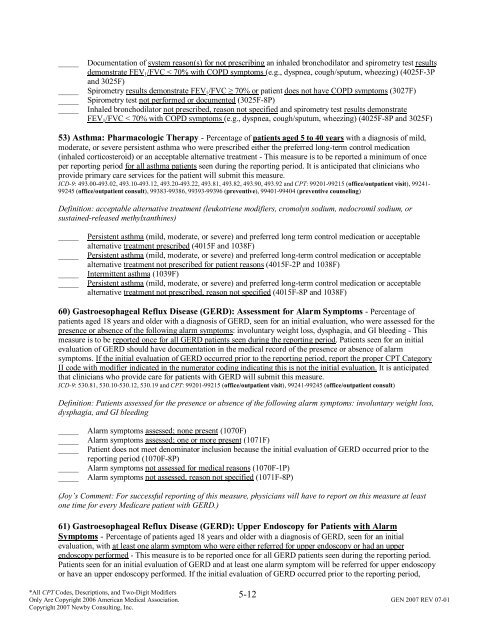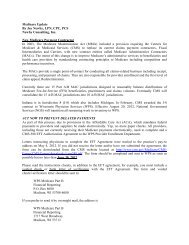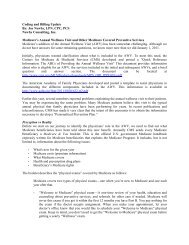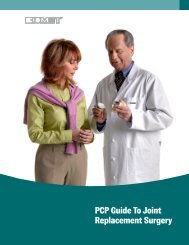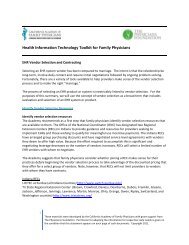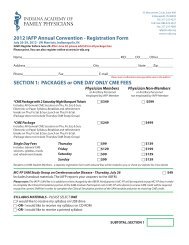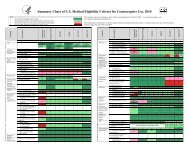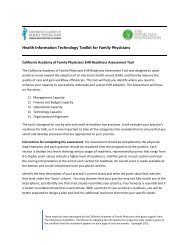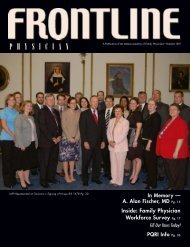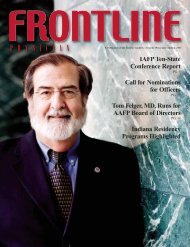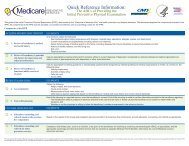pqri measure coding and reporting principles - Indiana Academy of ...
pqri measure coding and reporting principles - Indiana Academy of ...
pqri measure coding and reporting principles - Indiana Academy of ...
Create successful ePaper yourself
Turn your PDF publications into a flip-book with our unique Google optimized e-Paper software.
_____<br />
_____<br />
_____<br />
_____<br />
Documentation <strong>of</strong> system reason(s) for not prescribing an inhaled bronchodilator <strong>and</strong> spirometry test results<br />
demonstrate FEV 1 /FVC < 70% with COPD symptoms (e.g., dyspnea, cough/sputum, wheezing) (4025F-3P<br />
<strong>and</strong> 3025F)<br />
Spirometry results demonstrate FEV 1 /FVC ≥ 70% or patient does not have COPD symptoms (3027F)<br />
Spirometry test not performed or documented (3025F-8P)<br />
Inhaled bronchodilator not prescribed, reason not specified <strong>and</strong> spirometry test results demonstrate<br />
FEV 1 /FVC < 70% with COPD symptoms (e.g., dyspnea, cough/sputum, wheezing) (4025F-8P <strong>and</strong> 3025F)<br />
53) Asthma: Pharmacologic Therapy - Percentage <strong>of</strong> patients aged 5 to 40 years with a diagnosis <strong>of</strong> mild,<br />
moderate, or severe persistent asthma who were prescribed either the preferred long-term control medication<br />
(inhaled corticosteroid) or an acceptable alternative treatment - This <strong>measure</strong> is to be reported a minimum <strong>of</strong> once<br />
per <strong>reporting</strong> period for all asthma patients seen during the <strong>reporting</strong> period. It is anticipated that clinicians who<br />
provide primary care services for the patient will submit this <strong>measure</strong>.<br />
ICD-9: 493.00-493.02, 493.10-493.12, 493.20-493.22, 493.81, 493.82, 493.90, 493.92 <strong>and</strong> CPT: 99201-99215 (<strong>of</strong>fice/outpatient visit), 99241-<br />
99245 (<strong>of</strong>fice/outpatient consult), 99383-99386, 99393-99396 (preventive), 99401-99404 (preventive counseling)<br />
Definition: acceptable alternative treatment (leukotriene modifiers, cromolyn sodium, nedocromil sodium, or<br />
sustained-released methylxanthines)<br />
_____<br />
_____<br />
_____<br />
_____<br />
Persistent asthma (mild, moderate, or severe) <strong>and</strong> preferred long term control medication or acceptable<br />
alternative treatment prescribed (4015F <strong>and</strong> 1038F)<br />
Persistent asthma (mild, moderate, or severe) <strong>and</strong> preferred long-term control medication or acceptable<br />
alternative treatment not prescribed for patient reasons (4015F-2P <strong>and</strong> 1038F)<br />
Intermittent asthma (1039F)<br />
Persistent asthma (mild, moderate, or severe) <strong>and</strong> preferred long-term control medication or acceptable<br />
alternative treatment not prescribed, reason not specified (4015F-8P <strong>and</strong> 1038F)<br />
60) Gastroesophageal Reflux Disease (GERD): Assessment for Alarm Symptoms - Percentage <strong>of</strong><br />
patients aged 18 years <strong>and</strong> older with a diagnosis <strong>of</strong> GERD, seen for an initial evaluation, who were assessed for the<br />
presence or absence <strong>of</strong> the following alarm symptoms: involuntary weight loss, dysphagia, <strong>and</strong> GI bleeding - This<br />
<strong>measure</strong> is to be reported once for all GERD patients seen during the <strong>reporting</strong> period. Patients seen for an initial<br />
evaluation <strong>of</strong> GERD should have documentation in the medical record <strong>of</strong> the presence or absence <strong>of</strong> alarm<br />
symptoms. If the initial evaluation <strong>of</strong> GERD occurred prior to the <strong>reporting</strong> period, report the proper CPT Category<br />
II code with modifier indicated in the numerator <strong>coding</strong> indicating this is not the initial evaluation. It is anticipated<br />
that clinicians who provide care for patients with GERD will submit this <strong>measure</strong>.<br />
ICD-9: 530.81, 530.10-530.12, 530.19 <strong>and</strong> CPT: 99201-99215 (<strong>of</strong>fice/outpatient visit), 99241-99245 (<strong>of</strong>fice/outpatient consult)<br />
Definition: Patients assessed for the presence or absence <strong>of</strong> the following alarm symptoms: involuntary weight loss,<br />
dysphagia, <strong>and</strong> GI bleeding<br />
_____<br />
_____<br />
_____<br />
_____<br />
_____<br />
Alarm symptoms assessed; none present (1070F)<br />
Alarm symptoms assessed; one or more present (1071F)<br />
Patient does not meet denominator inclusion because the initial evaluation <strong>of</strong> GERD occurred prior to the<br />
<strong>reporting</strong> period (1070F-8P)<br />
Alarm symptoms not assessed for medical reasons (1070F-1P)<br />
Alarm symptoms not assessed, reason not specified (1071F-8P)<br />
(Joy’s Comment: For successful <strong>reporting</strong> <strong>of</strong> this <strong>measure</strong>, physicians will have to report on this <strong>measure</strong> at least<br />
one time for every Medicare patient with GERD.)<br />
61) Gastroesophageal Reflux Disease (GERD): Upper Endoscopy for Patients with Alarm<br />
Symptoms - Percentage <strong>of</strong> patients aged 18 years <strong>and</strong> older with a diagnosis <strong>of</strong> GERD, seen for an initial<br />
evaluation, with at least one alarm symptom who were either referred for upper endoscopy or had an upper<br />
endoscopy performed - This <strong>measure</strong> is to be reported once for all GERD patients seen during the <strong>reporting</strong> period.<br />
Patients seen for an initial evaluation <strong>of</strong> GERD <strong>and</strong> at least one alarm symptom will be referred for upper endoscopy<br />
or have an upper endoscopy performed. If the initial evaluation <strong>of</strong> GERD occurred prior to the <strong>reporting</strong> period,<br />
5-12<br />
*All CPT Codes, Descriptions, <strong>and</strong> Two-Digit Modifiers<br />
Only Are Copyright 2006 American Medical Association. GEN 2007 REV 07-01<br />
Copyright 2007 Newby Consulting, Inc.


